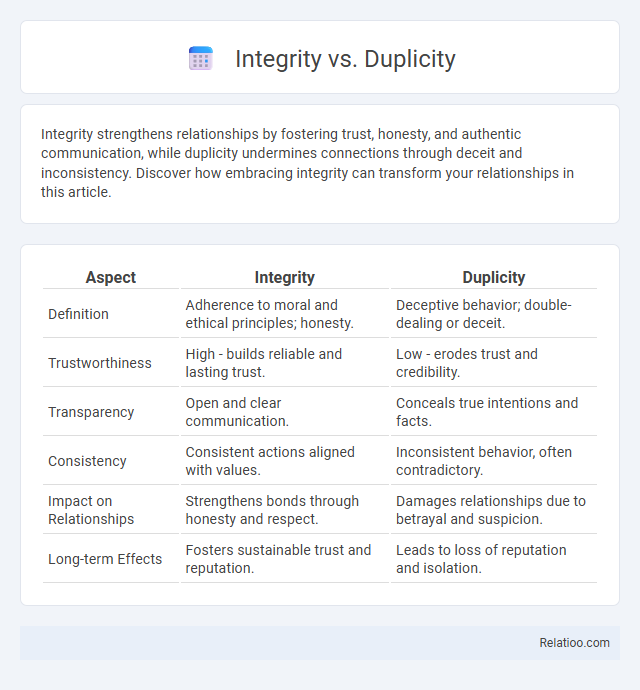Integrity strengthens relationships by fostering trust, honesty, and authentic communication, while duplicity undermines connections through deceit and inconsistency. Discover how embracing integrity can transform your relationships in this article.
Table of Comparison
| Aspect | Integrity | Duplicity |
|---|---|---|
| Definition | Adherence to moral and ethical principles; honesty. | Deceptive behavior; double-dealing or deceit. |
| Trustworthiness | High - builds reliable and lasting trust. | Low - erodes trust and credibility. |
| Transparency | Open and clear communication. | Conceals true intentions and facts. |
| Consistency | Consistent actions aligned with values. | Inconsistent behavior, often contradictory. |
| Impact on Relationships | Strengthens bonds through honesty and respect. | Damages relationships due to betrayal and suspicion. |
| Long-term Effects | Fosters sustainable trust and reputation. | Leads to loss of reputation and isolation. |
Understanding Integrity: The Foundation of Trust
Understanding integrity involves recognizing it as the unwavering adherence to moral and ethical principles, serving as the foundation of trust in personal and professional relationships. Integrity fosters transparency and accountability, distinguishing trustworthy individuals from those exhibiting duplicity or disloyalty. Building trust through consistent honesty and reliability enhances cooperation, reputation, and long-term success.
What is Duplicity? Defining Deceitful Behavior
Duplicity refers to the act of deliberately presenting false information or intentions to deceive others, often involving double-dealing or hypocrisy. This deceitful behavior undermines trust and contrasts sharply with integrity, which embodies honesty and consistency in actions and values. Recognizing duplicity involves identifying contradictory statements or actions that reveal hidden motives and dishonesty.
Key Differences: Integrity vs Duplicity
Integrity involves consistently adhering to moral and ethical principles, ensuring honesty and transparency in your actions. Duplicity, on the other hand, is characterized by deceitfulness and presenting false appearances to manipulate or gain advantage. The key difference lies in integrity's commitment to truth and trustworthiness, whereas duplicity undermines trust through dishonesty and hidden motives.
The Psychological Roots of Integrity
Integrity stems from a deep psychological need for consistency between your values, beliefs, and actions, fostering trust and self-respect. Duplicity arises when conflicting motives create cognitive dissonance, undermining one's sense of authenticity and reliability. Disloyalty often reflects unresolved emotional attachments or psychological insecurity, disrupting interpersonal trust and moral alignment.
Why People Choose Duplicity
People often choose duplicity because it can provide immediate advantages such as gaining trust, manipulating situations, or avoiding conflict, despite the long-term risks to their reputation and relationships. The temptation to secure personal or professional gain sometimes outweighs the value of integrity, especially in high-pressure environments where ethical boundaries feel blurred. Your awareness of these motivations can help you foster trust and encourage loyalty by promoting transparency and accountability.
Real-World Consequences of Integrity
Integrity fosters trust and strengthens professional relationships, promoting long-term success by ensuring consistent ethical behavior. Duplicity and disloyalty damage reputations and can lead to legal consequences, loss of business, and fractured partnerships. Your commitment to integrity safeguards your credibility, enhances collaboration, and builds a reliable foundation for sustained growth.
The Cost of Duplicity in Personal and Professional Life
Duplicity in personal and professional life erodes trust, leading to damaged relationships and a tarnished reputation that can limit opportunities for growth and collaboration. The cost of disloyalty manifests in lost credibility, decreased morale, and potential legal or financial repercussions that compromise both individual and organizational stability. Maintaining integrity fosters long-term success and resilience by cultivating transparent, reliable connections essential for sustainable advancement.
Building a Culture of Integrity
Building a culture of integrity requires consistent reinforcement of honesty, transparency, and ethical behavior at every organizational level. Addressing duplicity and disloyalty involves establishing clear values, fostering open communication, and implementing accountability mechanisms to deter deceptive actions. Embedding these principles cultivates trust, improves teamwork, and strengthens long-term organizational resilience.
Strategies to Recognize and Prevent Duplicity
Recognizing duplicity involves keen observation of inconsistent behaviors, conflicting statements, and frequent breaches of trust within interpersonal or organizational settings. Effective strategies to prevent duplicity include establishing transparent communication channels, enforcing strict ethical guidelines, and implementing regular integrity training programs to reinforce honest conduct. Utilizing tools like behavior analytics and anonymous reporting systems further aids in early detection and mitigation of disloyalty and duplicity risks.
Choosing Integrity: Long-Term Benefits Over Short-Term Gains
Choosing integrity over duplicity and disloyalty ensures sustained trust and credibility in personal and professional relationships. Your commitment to honesty fosters stronger connections and a solid reputation that withstands challenges and promotes long-term success. Embracing integrity reduces risks associated with deceit, ultimately delivering lasting benefits that surpass fleeting advantages.

Infographic: Integrity vs Duplicity
 relatioo.com
relatioo.com